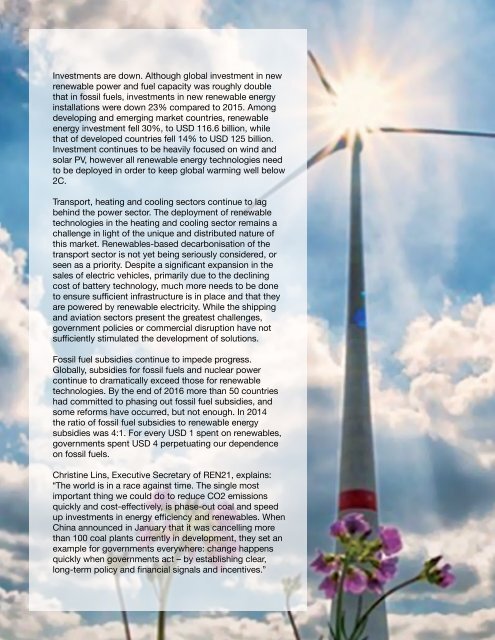Renewable Green Leaders Magazine: Promoting a Sustainable Future for Generations to Come by Dubai Electricity and Water Authority (DEWA)
Exclusive: H.E. Saeed Mohammed Al Tayer (MD & CEO of DEWA), ABB clean future, Kingspan PalDuct for Dubai Sustainable City, PAYG, Dubai Science Park, Bill Gates, Hilti. Special Feature Stories: Biomass energy, Geothermal energy, Hydro energy, Green buildings, Recycle, Solar, Sustainability, Upcycle, Energy storage, Tidal energy, Waste management, Wind energy, Circular Economy, Power generation, Cogeneration, Water and Wastewater, Utilities. Country Focus: United Arab Emirates, Saudi Arabia, Qatar, Bahrain, Kuwait, Oman, United Kingdom, Singapore, Hong Kong, Philippines, Malaysia, Indonesia, India, Australia. More engineering stories at https://www.gineersnow.com/topics/magazines
Exclusive: H.E. Saeed Mohammed Al Tayer (MD & CEO of DEWA), ABB clean future, Kingspan PalDuct for Dubai Sustainable City, PAYG, Dubai Science Park, Bill Gates, Hilti.
Special Feature Stories: Biomass energy, Geothermal energy, Hydro energy, Green buildings, Recycle, Solar, Sustainability, Upcycle, Energy storage, Tidal energy, Waste management, Wind energy, Circular Economy, Power generation, Cogeneration, Water and Wastewater, Utilities.
Country Focus: United Arab Emirates, Saudi Arabia, Qatar, Bahrain, Kuwait, Oman, United Kingdom, Singapore, Hong Kong, Philippines, Malaysia, Indonesia, India, Australia.
More engineering stories at https://www.gineersnow.com/topics/magazines
You also want an ePaper? Increase the reach of your titles
YUMPU automatically turns print PDFs into web optimized ePapers that Google loves.
Investments are down. Although global investment in new<br />
renewable power <strong>and</strong> fuel capacity was roughly double<br />
that in fossil fuels, investments in new renewable energy<br />
installations were down 23% compared <strong>to</strong> 2015. Among<br />
developing <strong>and</strong> emerging market countries, renewable<br />
energy investment fell 30%, <strong>to</strong> USD 116.6 billion, while<br />
that of developed countries fell 14% <strong>to</strong> USD 125 billion.<br />
Investment continues <strong>to</strong> be heavily focused on wind <strong>and</strong><br />
solar PV, however all renewable energy technologies need<br />
<strong>to</strong> be deployed in order <strong>to</strong> keep global warming well below<br />
2C.<br />
Transport, heating <strong>and</strong> cooling sec<strong>to</strong>rs continue <strong>to</strong> lag<br />
behind the power sec<strong>to</strong>r. The deployment of renewable<br />
technologies in the heating <strong>and</strong> cooling sec<strong>to</strong>r remains a<br />
challenge in light of the unique <strong>and</strong> distributed nature of<br />
this market. <strong>Renewable</strong>s-based decarbonisation of the<br />
transport sec<strong>to</strong>r is not yet being seriously considered, or<br />
seen as a priority. Despite a significant expansion in the<br />
sales of electric vehicles, primarily due <strong>to</strong> the declining<br />
cost of battery technology, much more needs <strong>to</strong> be done<br />
<strong>to</strong> ensure sufficient infrastructure is in place <strong>and</strong> that they<br />
are powered <strong>by</strong> renewable electricity. While the shipping<br />
<strong>and</strong> aviation sec<strong>to</strong>rs present the greatest challenges,<br />
government policies or commercial disruption have not<br />
sufficiently stimulated the development of solutions.<br />
Fossil fuel subsidies continue <strong>to</strong> impede progress.<br />
Globally, subsidies <strong>for</strong> fossil fuels <strong>and</strong> nuclear power<br />
continue <strong>to</strong> dramatically exceed those <strong>for</strong> renewable<br />
technologies. By the end of 2016 more than 50 countries<br />
had committed <strong>to</strong> phasing out fossil fuel subsidies, <strong>and</strong><br />
some re<strong>for</strong>ms have occurred, but not enough. In 2014<br />
the ratio of fossil fuel subsidies <strong>to</strong> renewable energy<br />
subsidies was 4:1. For every USD 1 spent on renewables,<br />
governments spent USD 4 perpetuating our dependence<br />
on fossil fuels.<br />
Christine Lins, Executive Secretary of REN21, explains:<br />
“The world is in a race against time. The single most<br />
important thing we could do <strong>to</strong> reduce CO2 emissions<br />
quickly <strong>and</strong> cost-effectively, is phase-out coal <strong>and</strong> speed<br />
up investments in energy efficiency <strong>and</strong> renewables. When<br />
China announced in January that it was cancelling more<br />
than 100 coal plants currently in development, they set an<br />
example <strong>for</strong> governments everywhere: change happens<br />
quickly when governments act – <strong>by</strong> establishing clear,<br />
long-term policy <strong>and</strong> financial signals <strong>and</strong> incentives.”


















